Barclays Bank has put up its UAE retail banking franchise for review ahead of a possible sale, as part of a plan intended to squeeze more profit out of its business.
Earlier this year, Barclays set out a worldwide strategic review called the "transform programme", intended to transition its business practices to restore its name after the Libor rate-rigging scandal forced its chairman and chief executive to resign last year.
Barclays operates two branches in the UAE, as well as offices in the Dubai International Financial Centre.
"As of now there's no decision," said a spokesman for the bank. "It's part of the transform programme ... The only difference is the retail business in the UAE is included."
The review will not include Barclays' investment banking or wealth management businesses, the spokesman added.
He said that the retail banking business in the UAE is profitable, though he declined to give specific figures with regard to the number of staff the bank employs in the Emirates.
Barclays said in February it would review 75 business units worldwide "to determine not only their ability to generate an appropriate and sustainable return on equity, but also their strategic attractiveness, including their effect on Barclays reputation".
Alongside other international institutions including Standard Chartered and HSBC, which last year paid a combined US$2.5 billion to settle investigations into their anti-money laundering standards, Barclays has faced increasingly strict compliance processes to ensure that it does not deal with customers from countries in the Middle East affected by sanctions.
Both HSBC and Barclays have imposed stringent limits on customers from countries including Syria, Iran and Sudan.
Dealing with nationals from these countries typically imposes higher "know-your-customer" costs, which can involve hiring a specific relationship manager to assess sources of income.
But international banks are currently facing difficulties proving they have enough capital to satisfy regulatory concerns in their home markets as lawmakers try to prevent a repeat of the global financial crisis.
In June, the prudential regulatory authority, the arm of the Bank of England that monitors macro risks, identified a £3bn (Dh17.01bn) capital shortfall at Barclays amid a review of the UK financial sector. HSBC and Standard Chartered, the other two British banks which maintain a retail banking presence in the UAE, were deemed to have enough capital.
At the end of July, Barclays set out plans for a £5.8bn rights issue due to be launched next month.
Bank mergers and acquisitions have become more common in the UAE during the past 18 months, though international banks are typically constrained by the Central Bank in how many branches they can have in each emirate.
Last year, HSBC purchased Lloyds TSB's retail and business banking franchise in Dubai, ending the bank's 35-year onshore presence in the region. Lloyds closed its remaining private banking franchise in May after selling it to Union Bancaire Privée.
Qatar National Bank said in August last year that it had increased its stake in Dubai's Commercial Bank International to 40 per cent.
Royal Bank of Scotland sold its retail banking franchise to Abu Dhabi Commercial Bank in 2010 for $100m, though it retains a commercial lending and investment banking franchise.





